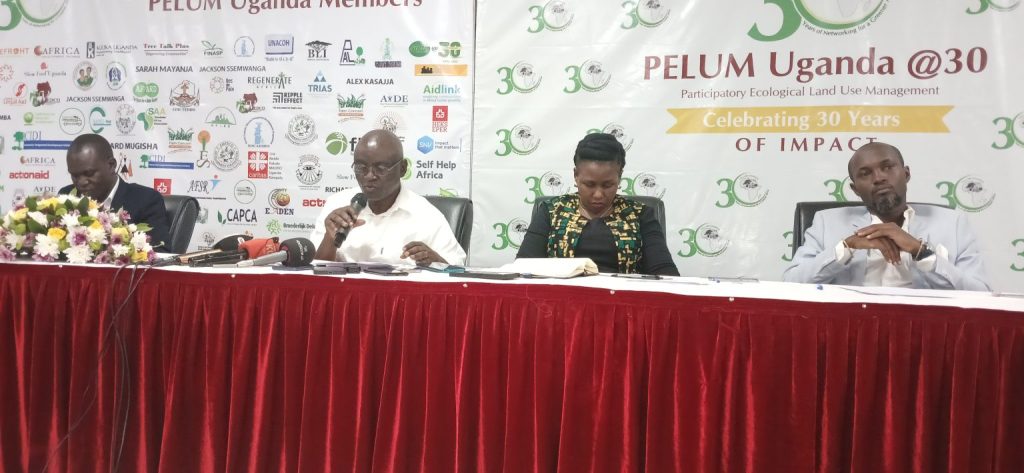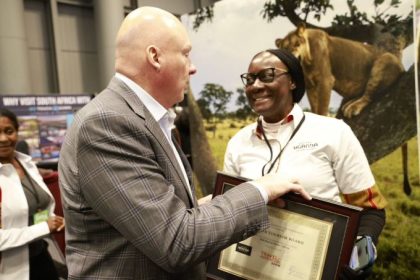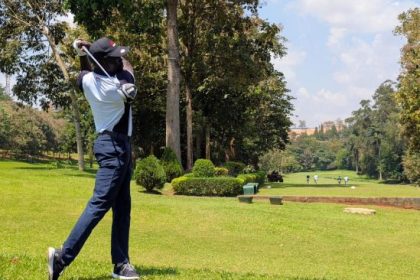PELUM amplifies calls to reclaim Uganda’s food future as Agroecology turns 30

“Indigenous foods are more than just a source of nutrition,” says Josephine Akia Luyimbazi, Country Coordinator of Participatory Ecological Land Use Management (PELUM) Uganda. “They are a living legacy of cultural identity, environmental stewardship, and traditional knowledge.”
Akia Luyimbazi was speaking at the launch of the Agroecology Week of Action (AWA) 2025, a weeklong series of events aimed at re-anchoring Uganda’s food systems in ecological balance, community resilience, and cultural integrity. This year’s edition coincides with PELUM Uganda’s 30th anniversary, marking three decades of promoting agroecology across the country.
Scheduled for October 27th–31st in Kampala, the AWA is being organised in partnership with the Ministry of Agriculture, Animal Industry and Fisheries (MAAIF) and other national stakeholders under the theme “Championing Agroecological Innovations and Approaches for Sustainable Food Systems.”
The week seeks to shift agroecology “from advocacy to action,” consolidating gains made by farmers, researchers, policymakers, and market actors.
According to Christopher Kyeswa, Chairperson of PELUM Uganda, agroecology is not simply organic farming but “a holistic and integrated approach that applies ecological and social principles to the design and management of sustainable food systems.” He described the AWA as “a platform for mobilisation and constituency building” to demonstrate agroecology’s economic and ecological relevance.
At least 1,500 participants are expected, including small-scale farmers, Indigenous communities, entrepreneurs, civil society, financiers, and policymakers — all exploring how Uganda can feed itself sustainably without undermining its natural resource base.
The week opens on October 27th with a press conference to set the agenda and mobilize participation. The following day, October 28th, features the 7th National Agroecology Actors’ Symposium, themed “Accelerating Agroecology Transitions for Sustainability: Reshaping Policy, Markets, Finance, and Practice for Transformative Change.”
The symposium will examine how to align agricultural policy with local realities, strengthen financial mechanisms for sustainable production, and expand markets that reward ecological practices.
On October 29th, attention will turn to enterprise development during the 4th Agroecological Market Systems Expo (AMASE), themed “Promoting Youth- and Women-Led Agroecological Innovations and Technologies for Improved Incomes in Uganda.” Business clinics, trade showcases, and policy dialogues will explore how green entrepreneurship can thrive through innovation and inclusion.
From October 30th to 31st, the 15th Indigenous and Traditional Food and Seed Fair will highlight “Uganda’s Indigenous Food and Cultural Diversity,” celebrating the country’s culinary and seed heritage through exhibitions, food tastings, and cooking demonstrations. The fair underscores the link between biodiversity, nutrition, and food sovereignty.
The week will culminate in PELUM Uganda’s 30th anniversary celebration, tracing its evolution from a grassroots network to a national voice for sustainable land use and ecological agriculture.
For Moses Onen, PELUM’s Programme Manager for Advocacy, the Agroecology Week is less a commemoration than a reckoning. “This is about consolidating 30 years of learning and charting new directions for resilience,” he said. “Agroecology is not a marginal alternative — it is the foundation of a just and sustainable food economy.”
PELUM Uganda’s call comes amid growing recognition of the vulnerabilities in industrial food systems — from climate shocks to soil degradation and dependence on external inputs.
Over the past three decades, PELUM Uganda has helped integrate agroecology into the national agricultural policy framework, established 25 community seed banks, facilitated the issuance of over 5,000 Customary Certificates of Ownership to secure communal land in Nebbi, Karamoja, Amuru, Teso, Lango, and Elgon, and trained community paralegals to promote equitable access to land.
For Akia Luyimbazi, these milestones are reminders that the future of food security depends as much on cultural memory as on scientific innovation. “Agroecology is not just a method,” she says. “It’s a way of life rooted in balance — between people, the land, and the generations to come.”


 Equity Bank Uganda set to close 2025 on firmer footing as clean-up phase gives way to growth
Equity Bank Uganda set to close 2025 on firmer footing as clean-up phase gives way to growth
 USA–Canada certification dispute could expose Uganda and regional airlines to regulatory risk
USA–Canada certification dispute could expose Uganda and regional airlines to regulatory risk
 KPMG flags widening execution gap as tech leaders bet on AI maturity, talent and partnerships
KPMG flags widening execution gap as tech leaders bet on AI maturity, talent and partnerships
 Destination Uganda clinches “Best in Show – Africa” at New York Travel & Adventure Show
Destination Uganda clinches “Best in Show – Africa” at New York Travel & Adventure Show
 Uganda’s Kibirige edges closer to global golf stage after strong PGTI Q-School showing in India
Uganda’s Kibirige edges closer to global golf stage after strong PGTI Q-School showing in India
 Breathtaking Uganda unveils curated Easter getaway to Zanzibar
Breathtaking Uganda unveils curated Easter getaway to Zanzibar